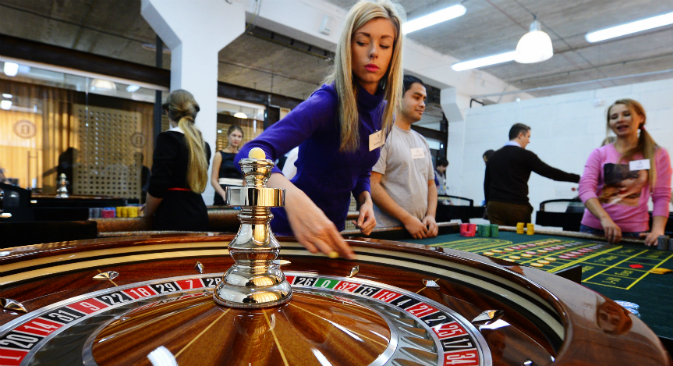
The Primorye casino complex aims to attract up to 10 million visitors a year. Source: Tass
Russia has signed agreements with investors, including gambling tycoon Lawrence Ho, on constructing a new casino center near the Far Eastern city of Vladivostok.
Investors are pushing forward with the multi-billion dollar gambling center, hoping to lure up to 10 million visitors a year to a Russian version of Macau.
The resort area’s first casino is set to open its doors this September. Investors are planning to plow a total of $2.2 billion into the gambling complex, which has been dubbed “Primorye” after the Russian name for the region.
“Considering the zone’s geographical location, we can assume that about 50 percent of all visitors will come from Asia, especially from China,” said Timur Nigmatullin, analyst at Finam investment company.
Analysts said that Primorye might benefit from being significantly closer to northern China than Macau, which is the largest gambling center in Asia and is situated on China’s southern coast near Hong Kong.
One of Primorye’s key investors is Melco International Ltd, a firm belonging to Lawrence Ho, one of the heirs to Stanley Ho’s gambling empire in Macau.
Apart from the Ho family, other large investors in the project include Diamond Fortune, which is preparing to begin the construction of a casino dubbed Golden Gate as early as the first half of 2016.
Royal Time Group, the project’s third investor, which is already heavily involved in the Azov-City gambling zone, is expecting to start the construction of its 250 thousand square meter Zhar-Ptitza (‘firebird’) casino and resort this summer.
The designers behind the project say the name was picked for a reason, since the future resort will mostly target Asian tourists.
The Zhar-Ptitza, or Phoenix as it is also known, is a mythical bird, which arises from the ashes, and is considered highly symbolic in some Asian cultures.
“The project’s entire infrastructure has a uniform Asia-influenced style,” says Alexey Belinsky, head of the European division of Steelman Partners, an architectural company working on the project.
The original plan called for the casino to house 500 slot machines and 30 gambling tables. But the numbers are currently being reviewed and may reach 3000 machines and 150 tables.
Once completed, the 619- hectare space will include 15 hotels, 12 rental villas, a yacht club, a multifunctional trade fair complex and other recreational infrastructure.
The zone will eventually be able to compete with Macau for the title of Asia’s largest gambling center – and, according to Russian experts, it has several crucial advantages.
Primorye is closer to northern China than Macau, with Vladivostok located a two-and-a-half hour flight from Beijing and just a one-and-a-half hour flight away from Harbin, the capital and largest city of Heilongjiang province which borders Russia.
According to Russia’s Ministry for the Development of the Far East, the approximate revenues of the Primorye complex may amount to $1.2 billion, reaching up to $5.2 billion in ten years. The tax rates for the zone will be between 3 percent and 7 percent - significantly lower than Macau’s 39 percent.
Russia, which by national law prohibits gambling outside specially-established zones, has established gambling centers in other areas, including in the European-influenced exclave of Kaliningrad, the Altai Territory in Eastern Siberia and in the Russian Far East.
Analysts said Primorye has the best prospects of any gambling zone established by Russia so far.
“According to my estimates, given the project will likely receive some tax relief, the investments in the project should pay off in about 18 months to two and a half years after the construction is completed,” says Timur Nigmatullin, analyst at Finam investment company. “The Primorye gambling zone is the most promising project compared with other similar zones in Russia.”
Nigmatullin says the entertainment business — and gambling in particular — is traditionally cost effective and is considered to return on investment quickly. A weaker ruble will also make visiting the resort cheaper, he said.
All rights reserved by Rossiyskaya Gazeta.
Subscribe
to our newsletter!
Get the week's best stories straight to your inbox